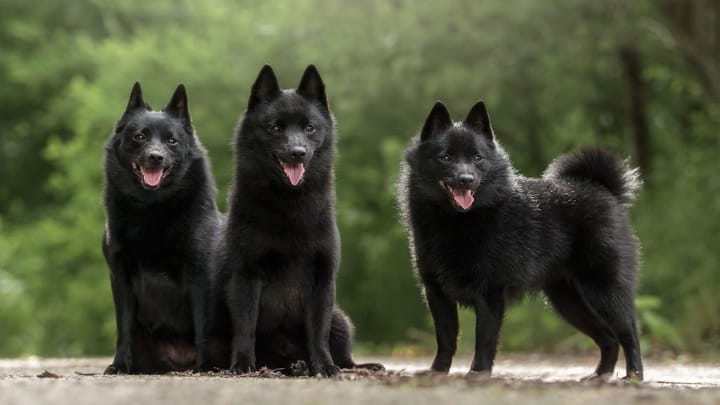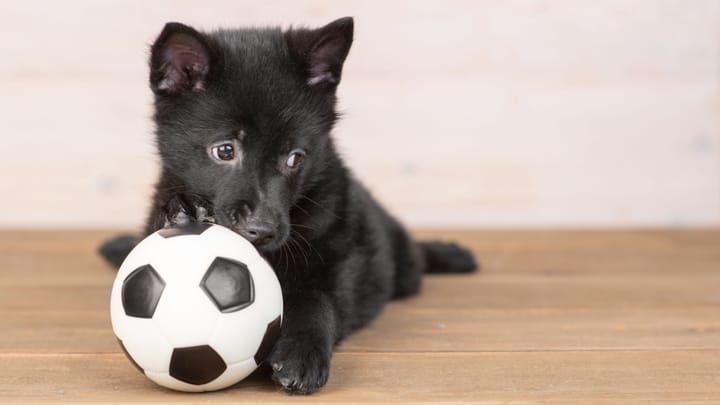Schipperke
Other name: LBD


The Schipperke is a bold, lively and protective dog who was originally used to guard boats and hunt rats. With its small size, adorable yet easy-to-care-for coat and friendly attitude, the Schipperke has become a popular family companion dog. With high intelligence and bags of curiosity can come trouble - yes, this breed has ‘small dog, big personality’ down to perfection. Truthfully, you’ll never have a dull day with the Schipperke around, but then, you may never have a quiet one, either!
|
Life expectancy |
The Schipperke has a life expectancy of between 13 and 15 years |
|
Temperament |
|
|
Size |
Small
|
|
Adult size |
Female
Between 8 and 12 in
Male
Between 8 and 12 in
|
|
Adult weight |
Female
Between 7 and 20 lb
Male
Between 7 and 20 lb
|
|
Coat colour
Black. |
Black |
|
Type of coat
Medium length, double, thick, straight and soft. |
Long Hard |
|
Eye colour
Dark brown. |
Brown
|
The Schipperke is commonly nicknamed the ‘Little Black Devil’ due to its mischievous and lively nature - you have been warned!
More details about the Schipperke
Schipperke: Origins and history
The origins of the Schipperke go way back to the late seventeenth century, when documents speak of a dog who lived with the cobblers of the Saint-Géey district of Brussels. These shoemakers organized strange canine "exhibitions" where the subject was not so much the dog as the necklace made by craftsmen! According to legend, a shoddy cobbler who did badly at one of these necklace shows, expressed his disappointment by cutting off the tail of the winning dog. That dog was so prized that a trend started, and other owners began to cut the tail of their dogs. Fortunately, this practice is now prohibited.
Physical characteristics of the Schipperke
The Schipperke is a truly distinctive looking breed, with a lovely, fluffy black coat and fox-like face. The ears are small and pointy, standing completely erect at the top of the head. The head is wedge-shaped with eyes which are small and dark with an alert, mischievous gleam. The body is small and thick for its size, with short legs and a well-muscled, stocky appearance.
FCI classification of the Schipperke
-
Group 1 - Sheepdogs and Cattledogs (except Swiss Cattledogs)
-
Section 1 : Sheepdogs
Schipperke: Characteristics
Schipperke: Behaviour
Training a Schipperke
The Schipperke is very receptive to education. It is eager to learn and please its masters. If well-trained and socialized, this dog can excel at obedience competitions.
Schipperke: Lifestyle
Breed compatibility Schipperke
Schipperke: Purchase price
We do not have enough data to set an average price, but you can expect to pay upwards of £400 for a well-bred puppy. Looking after a dog of this size typically costs between £50 to £80 a month, including food, medical/insurance, and incidental expenses.
Schipperke: Shedding
Average
Low shedding generally, but sheds heavily twice a year.
Schipperke: Grooming
You may think that the Schipperke’s lovely coat is high-maintenance in terms of grooming, but that couldn’t be further from the truth! All this breed needs is a simple weekly brushing. The coat fluffs up and styles itself naturally, so there’s no need for trimming or cutting.
Schipperke: Health
This is a healthy and robust breed, known to have a particularly long lifespan - the oldest reported Schipperke was 17 and a half years old! Their average life expectancy is 14 years.
The Schipperke is well-muscled for its size and fairly hardy. It is known to live longer than most breeds.
Provide cold water and shade, and check for signs of heatstroke, if the weather turns hot.
Its dense dress and tight undercoat give the Schipperke a very good protection against bad weather and cold.
The Schipperke should be okay as long as its exercise needs are met.
- Cataracts
- Progressive Retinal Atrophy
- Hip Dysplasia
- Leg-Calve-Perthes Disease
- Hypothyroidism
- Mucopolysaccharidosis Type IIIb



